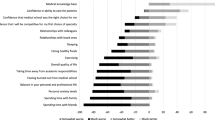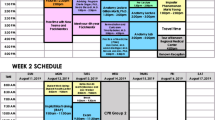Abstract
Incoming medical students arrive from diverse academic backgrounds and different levels of preparedness for the challenges of medical school. These students face major academic and lifestyle transitions in order to be successful in the fast-paced medical school curriculum. The goal of the medical post baccalaureate (PB) program at the Lake Erie College of Osteopathic Medicine (LECOM) is to prepare students (often with below-average grade point average (GPA) and Medical College Admission Test (MCAT) scores) for medical school course content and aid these students in the development of appropriate time-management and study skills. It was hypothesized that graduates of LECOM’s PB program would perform as well as their non-PB classmates. Analysis of longitudinal study data revealed that LECOM PB students matriculated medical school with undergraduate GPAs and MCAT scores significantly lower than their non-PB classmates. However, LECOM PB graduates performed statistically similar to non-PB classmates on their step 1 board examination, at the end of their second year of medical school. Additionally, survey results suggest that LECOM PB graduates perceived they were better prepared for multiple aspects of medical school compared to their peers. These findings suggest that a 1-year PB program, heavy in basic biomedical science, prepares students for academic and social challenges they will face in medical school.

Similar content being viewed by others
References
Niemi PM, Vainiomäki PT. Medical students’ distress—quality, continuity and gender differences during a six-year medical programme. Med Teach. 2006;28(2):136–41.
Vitaliano PP, Russo J, Carr JE, Heerwagen JH. Medical school pressures and their relationship to anxiety. J Nerv Ment Dis. 1984;172(12):730–6.
Dyrbye LN, Thomas MR, Shanafelt TD. Medical student distress: causes, consequences, and proposed solutions. Mayo Clin Proc. 2005;80(12):1613–22.
Hojat M, Blacklow RS, Robeson M, Veloski JJ, Borenstein BD. Postbaccalaureate preparation and performance in medical school. Acad Med. 1990;65(6):388–91.
Smith SR. A two-year experience with premedical postbaccalaureate students admitted to medical school. Acad Med. 1991;66(1):52–3.
Reeves RE, Vishwanatha JK, Yorio T, Budd M, Sheedlo HJ. The post-baccalaureate premedical certification program at the University of North Texas Health Science Center strengthens admission qualifications for entrance into medical school. Acad Med. 2008;83(1):45–51.
Manusov EG, Livingston H, Wang A, Berne-Anderson T, Alston S, Foster E, et al. Student’s perspective of success in a postbaccalaureate program. J Natl Med Assoc. 2011;103(9–10):822–30.
Acknowledgments
The authors would like to thank Zachary Kwasnicka for early development of the survey, Nicky Bell for handling technical aspects of the survey, and Dr. Molly Johannessen for her helpful comments on a draft version of the manuscript. Finally, we would like to thank all of the students who participated in the survey.
Conflict of Interest
The authors report no conflicts of interest.
Author information
Authors and Affiliations
Corresponding author
Appendix
Appendix
Student Survey
What was the highest level of education you have completed?
-
BA/BS
-
LECOM Post Bacc
-
Other Post Bacc
-
Master’s
-
Doctoral
My program prepared me for the ______ of medical school.
-
Workload
-
Time commitment
-
Rigor
-
Stress
-
Type of thinking
-
Methods of evaluations
-
Ability to use resources effectively
-
Knowledge of available resources
-
Confidence to approach faculty
-
Study skills
-
Methods of instruction
-
Social environment
My program helped me develop ______:
-
Time management skills
-
Stress coping strategies
My program ______:
-
Was a valuable experience
-
Was an accurate representation of a medical school curriculum
-
Helped me gain entry into medical school
-
Prepared me for medical school
-
Helped me be successful in medical school
-
Made the transition to medical school easier
-
Developed my confidence in completing a medical curriculum
Rights and permissions
About this article
Cite this article
Kulesza, R.J., Hu, W. & Bateman, M. Longitudinal Assessment and Perceptions of Medical Post Baccalaureate Students. Med.Sci.Educ. 25, 19–26 (2015). https://doi.org/10.1007/s40670-014-0075-5
Published:
Issue Date:
DOI: https://doi.org/10.1007/s40670-014-0075-5




